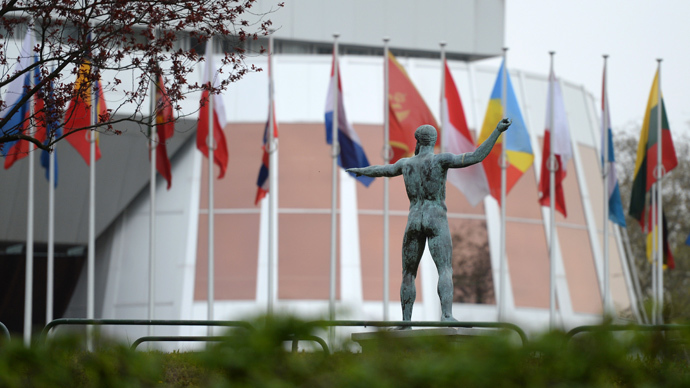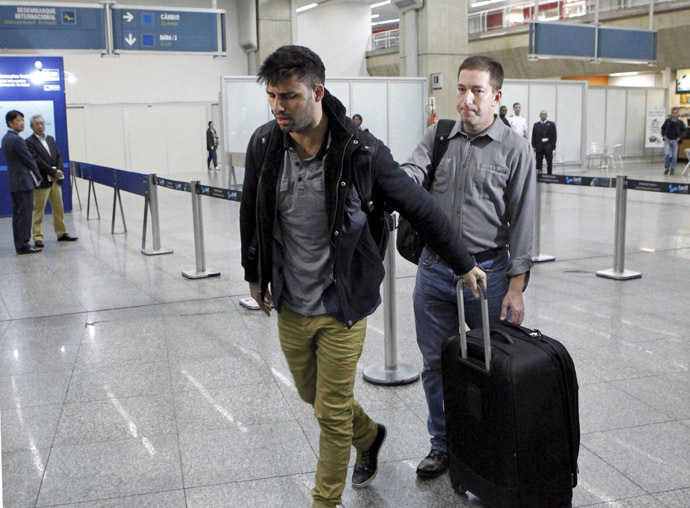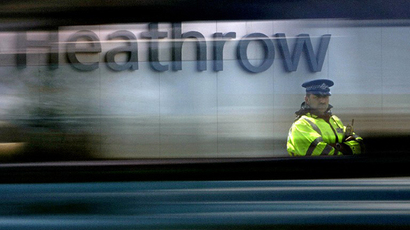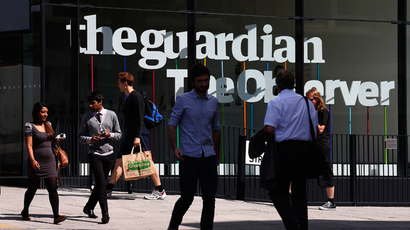UK’s actions 'incompatible' with Human Rights Convention – Council of Europe

The Guardian’s partial legal victory over the UK government’s seizure of documents still bodes badly for press freedom and is incompatible with EU convention, Daniel Holtgen, Director of Communications at the Council of Europe told RT.
Judges ruled on Thursday that the UK can sift through documents taken from Guardian journalist Glenn Greenwald’s Brazilian partner, but needs to prove the presence of a national security threat before investigation of seized electronic documents is pursued.
Holtgen told RT that the UK has been instructed to appreciate the apparent incompatibility of its actions in connection with Article 10 of the European Convention on Human Rights, which provides the right to freedom of expression.
Police confiscated electronic documents from 28 year old David Miranda, a Brazilian national, detaining him for nine hours last Sunday under Schedule 7 of the UK’s terrorism act, when he arrived at Heathrow Airport in transit for Brazil.
RT:The letter said there could be a “chilling effect
on journalistic freedoms” – what exactly did you mean by
that?
DH: All interventions in the press and interventions in
newspapers can potentially have that [chilling] effect. The
purpose of this letter was to inquire with the UK government how
they see these two actions – so the detention of the partner of
Glenn Greenwald – and also the destruction of the hard drives –
how they see this incompatibility with article 10 of the human
rights convention which is freedom of expression
RT:The Guardian still had to destroy NSA files over national security concerns – what’s the problem when the government defends itself?
DH: We’re not refuting that there may be national security concerns and we have read the reports and the responses from the UK government. I think this is simply a reminder that there is article 10 of the convention and press freedom is valued very highly across Europe and we apply the same standards to all our member states. You recall that many states have been in the spotlight regarding press freedom, especially eastern Europe. Europe has been commenting the situation in Hungary recently and also in Turkey and in other states, but I think we have to apply the same standards to all of our members, and these two actions do pose certain questions – we’re asking some background information from the UK government and I’m pretty sure we’ll receive a response very soon.

RT:So do you think the British government directly
violated the human rights convention signed by the EU member
states by doing this?
DH: Nobody’s suggesting that. The letter doesn’t make any reference to violations. It’s simply inquiring how the UK government sees these two actions under its obligations under the convention.
RT:We know the Guardian’s Editor-in-chief said that the newspaper has digital copies of the data outside Britain. Do you see the government going after those too?
DH: This is really not for me to comment but what I would say is that the letter has some grounds. As you will have noticed, the partner of Glenn Greenwald has won a temporary injunction before Britain’s high court protecting his material, so there is some grounds to our concerns and for us to have written the letter. I think we must protect journalists no matter where they work. They do some fundamental work for democracy across Europe. But of course we respect if there are national security concerns and I’m sure the UK government will respond accordingly.
RT:We know David Miranda was questioned under the
terror act for many hours, and a lot of people think his
detention under that particular law wasn’t justified. What do you
think?
DH: We need to have the facts and the response from the
government to make an assessment. All we are saying and
suggesting in that letter is that actions of these kinds can have
a chilling effect on freedom of expression, but again we are not
making a judgment and we do respect member states’ rights for
…right to state secrets and protecting those secrets.














